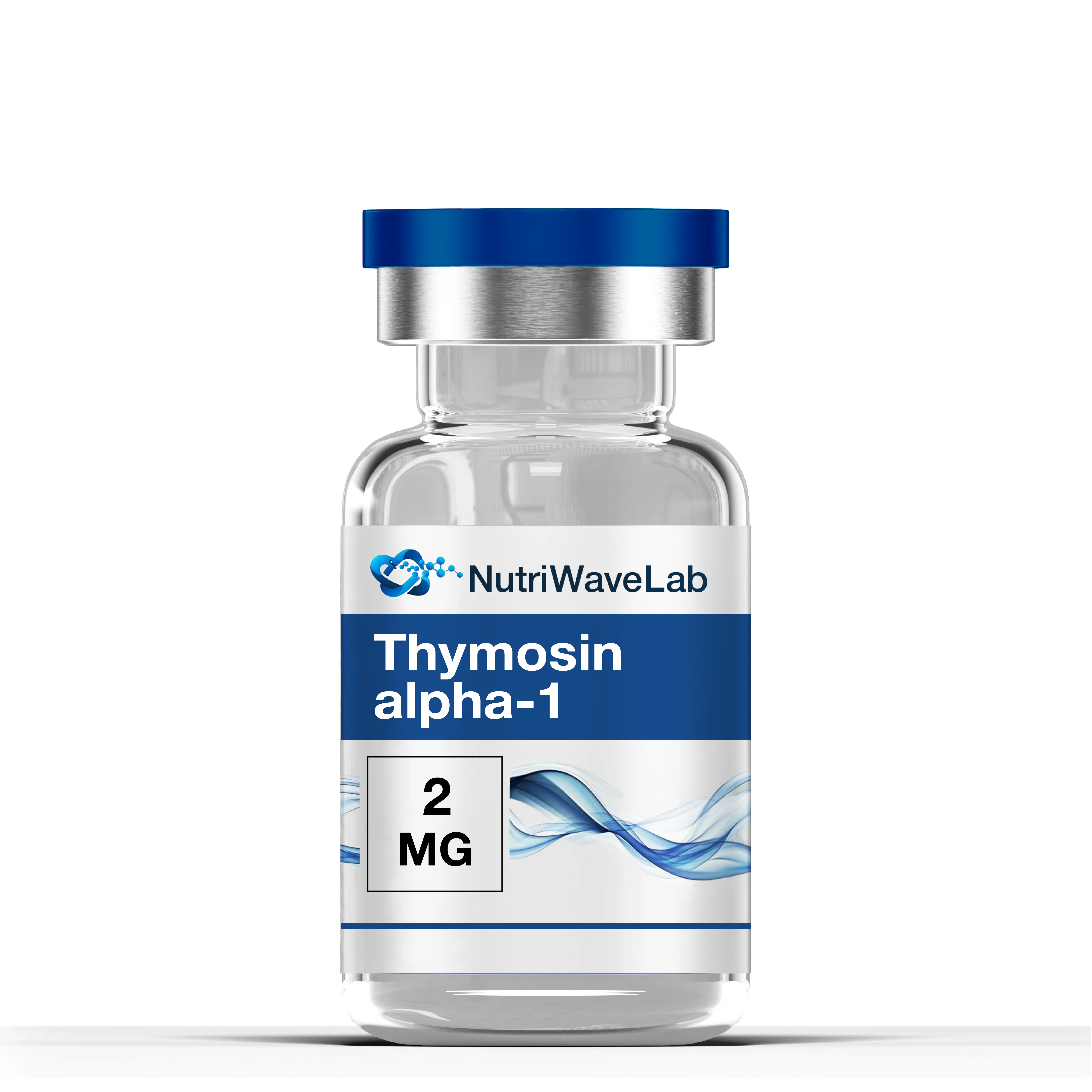Thymosin alpha-1 2mg
$0.00
- when buying 5 units of goods 5% discount
- when buying 10 units of goods 8% discount
2 in stock
Thymosin Alpha-1 (Tα1) — Immunomodulatory Peptide for Systemic Balance
Chemical Information
-
Peptide Name: Thymosin Alpha-1 (Tα1)
-
Amino Acid Sequence: Ser-Asp-Ala-Ala-Val-Asp-Thr-Ser-Ser-Glu-Ile-Thr-Thr-Lys-Asp-Leu-Lys-Glu-Lys-Lys-Glu-Val-Val-Glu-Glu-Ala-Glu-Asn
-
Molecular Formula: C₁₂₉H₂₁₅N₃₃O₅₅
-
Molecular Weight: 3108.3 g/mol
-
CAS Number: 62304-98-7
-
PubChem CID: 16130571
-
Synonyms: Thymalfasin, Thymosin α-1, Zadaxin, Thymosina-1, Thymosin α-1 acetate
Overview
Thymosin Alpha-1 (Tα1) is a naturally occurring 28-amino acid peptide originally isolated from thymic tissue.
Rather than simply “boosting immunity,” it rebalances immune architecture, optimizing both innate and adaptive immune pathways.
Tα1 acts as a conductor in the immune orchestra — not amplifying one instrument, but synchronizing the entire ensemble of immune cells to restore order in dysregulated systems.
First discovered in the early 1970s, Thymosin Alpha-1 has since been studied in over 70 clinical trials across conditions such as chronic hepatitis, sepsis, cystic fibrosis, viral infections, and cancer immunotherapy.
It is currently approved in more than 35 countries for the treatment of chronic Hepatitis B and C, and continues to attract global research interest as a potent endogenous immunomodulator.
Mechanisms of Action
Thymosin Alpha-1 modulates the immune system at multiple levels:
-
Activates T-lymphocytes (CD4⁺ and CD8⁺) and enhances antigen-specific responses;
-
Increases NK cell cytotoxicity and macrophage phagocytic activity;
-
Boosts interferon production, particularly IFN-α and IFN-γ;
-
Upregulates HLA-II expression on antigen-presenting cells;
-
Downregulates Treg cells in chronic infection and cancer environments;
-
Exerts antiviral effects, reducing replication of HBV, HCV, EBV, HPV, and SARS-CoV-2.
By harmonizing innate and adaptive immune activity, Tα1 helps re-establish immune homeostasis and resilience under chronic inflammatory or immunosuppressed conditions.
Immunomodulation and Clinical Research
Thymosin Alpha-1 supports T-cell maturation and corrects immune dysregulation associated with viral or oncologic processes.
It restores immune responsiveness without overstimulation, which makes it distinct from non-specific immune stimulants.
In multiple clinical models:
-
In sepsis, Tα1 reduced mortality and organ damage through immune re-balancing.
-
In viral infections, it enhanced vaccine responsiveness to inactivated antigens by improving both antibody titers and memory T-cell activity.
-
In post-viral fatigue and secondary immunodeficiency, it promoted recovery of lymphocyte counts and normalized cytokine signaling.
Neuro-Immune and Regenerative Effects
Emerging studies show Thymosin Alpha-1 participates in neuroimmune cross-talk, influencing neuronal growth and brain plasticity.
Animal models indicate that peripheral administration of Tα1 enhances neurogenesis, improves memory performance, and modulates gene networks responsible for neuron survival.
These effects are believed to be mediated by systemic cytokine normalization and reduction of neuroinflammatory pathways.
Antifungal and Antiviral Activity
Tα1 promotes maturation of dendritic cells, improving antigen presentation and resistance to fungal infections (e.g., Aspergillus).
It also enhances Th1-type immunity, supporting antifungal defense and improved vaccine efficacy.
At the antiviral level, Tα1 helps CD8⁺ cytotoxic T-cells produce inhibitory factors that suppress replication of HIV and other persistent viruses.
Applications in Hepatitis and HIV Research
-
Hepatitis B and C: Used as an adjuvant with antivirals or vaccines to increase viral clearance and long-term seroconversion.
-
HIV studies: Shown to improve immune regulation in HAART-treated patients, mitigating chronic inflammation and restoring cytotoxic T-cell function.
Anti-Cancer and Anti-Inflammatory Research
Thymosin Alpha-1 exhibits anti-proliferative and anti-metastatic properties in preclinical tumor models, including melanoma, breast, lung, and liver cancers.
When combined with standard chemotherapeutics (e.g., dacarbazine or interferon-α), it enhances efficacy while reducing treatment toxicity.
Novel Tα1-Fc fusion peptides demonstrate extended half-life and enhanced immune activation, offering new directions in oncology research.
Additionally, by suppressing pro-inflammatory cytokines (TNF-α, IL-1β, IL-6), Tα1 shows promise in chronic inflammatory pain and autoimmune disorders characterized by T-cell exhaustion.
Other Emerging Research Areas
-
Cystic Fibrosis: Tα1 improves CFTR protein folding and reduces pulmonary inflammation.
-
Hypertension: Preliminary studies show ACE inhibition and vascular protective effects.
-
Dental Trauma: Promotes gingival healing and graft survival after tooth re-implantation.
-
Post-COVID and Chronic Fatigue: Supports immune recalibration and restoration of energy metabolism.
Primary Research Focus
-
Chronic viral infections (HBV, HCV, HPV, EBV)
-
Immunodeficiency and immune exhaustion
-
Oncology and adjuvant immunotherapy
-
Neuroinflammatory and post-viral fatigue syndromes
-
Anti-aging and peptide-based immune optimization
-
Autoimmune modulation and cytokine balance
Summary
Thymosin Alpha-1 (Tα1) represents one of the most studied endogenous immunomodulatory peptides, capable of fine-tuning immune response rather than merely stimulating it.
Its broad activity spectrum — from antiviral and anti-tumor to regenerative and anti-inflammatory — makes it a cornerstone molecule for advanced immunology research.
Tα1 is provided for research and educational purposes only.
Not for human or veterinary use.
Selected References
-
King R., Tuthill C. Immune Modulation with Thymosin Alpha-1 Treatment. Vitam Horm. 2016.
-
Pei F., Guan X., Wu J. Thymosin Alpha-1 treatment for patients with sepsis. Expert Opin Biol Ther. 2018.
-
Wang G. et al. Thymosin Alpha-1 promotes neurogenesis and cognition in developing mice. Neurosci Bull. 2017.
-
Romani L. et al. Thymosin α1 activates dendritic cells for antifungal Th1 resistance. Blood. 2004.
-
Goldstein A.L. et al. Emerging clinical applications of Thymosin Alpha-1. Expert Opin Biol Ther. 2009.
-
Matteucci C. et al. Thymosin α1 and HIV-1: recent advances and perspectives. Future Microbiol. 2017.
-
Kharazmi-Khorassani J. et al. ACE inhibitory and antioxidant activity of Thymosin Alpha-1. Bioorg Chem. 2019.
-
Maio M. et al. Thymosin Alpha-1 with interferon or dacarbazine in melanoma therapy. J Clin Oncol. 2010.
-
Wang F. et al. Thymosin Alpha-1-Fc modulates the immune system and down-regulates melanoma progression. Sci Rep. 2018.
-
Romani
Product Use: THIS PRODUCT IS STRICTLY FOR
SCIENTIFIC RESEARCH PURPOSES ONLY. It should only be used in laboratory
settings. All product information on this website is provided solely for
educational purposes. The law strictly prohibits introducing this product into
the body of humans or animals. Only licensed professionals should handle this
product. This product is not a drug, food, or cosmetic and should not be
improperly classified or used as such.



Reviews
Clear filtersThere are no reviews yet.